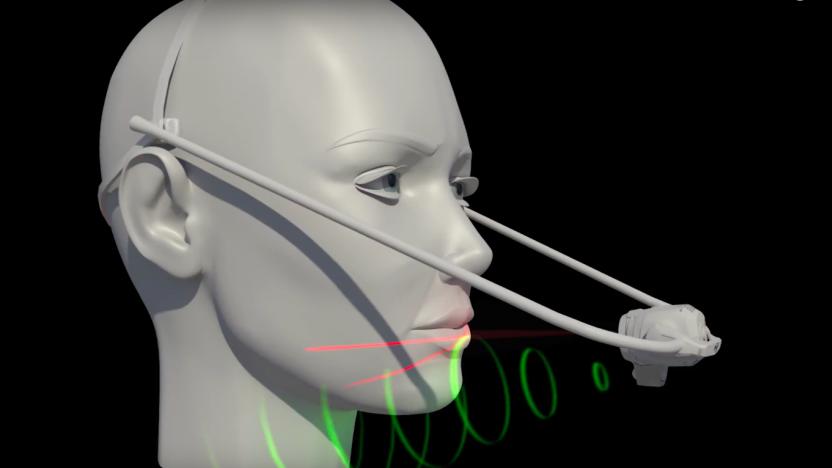speechsynthesis
Latest

BabelOn is trying to create Photoshop for your voice
Speech synthesis -- the process of artificially creating the human voice -- isn't anything new. But a startup from San Francisco called BabelOn is working on a particularly unique offshoot of this technology. In a nutshell, BabelOn wants to make it a trivial matter to translate your own voice into another language, even if you don't speak that language yourself. The company says its combo of software and custom-built hardware can analyze what makes up your voice and then use that to recreate speech that sounds just like you, in a language of your choosing. Initially, the company wants to use its technology for things like improving dubbed films or localizing video games, but eventually it wants to be able to translate your speech in real time, say while you're on a Skype call. Microsoft has done this for a while, translating Skype voice calls on the fly, but BabelOn promises that its translations will sound like you, not an anonymous Siri- or Cortana-like digital voice.

AT&T intros free Android accessibility solution for visually impaired (video)
If you or somebody you know is blind or visually impaired, then you'll definitely want to take note of AT&T's latest offering for its Android phones, which is certainly more charitable than its prior solution. For a limited time, the carrier is distributing a free, customized version of Mobile Accessibility, an app that provides voice cues and assistance for completing many common tasks on Google-powered smartphones. Users will find the ability to place calls, send email and text messages, set alarms, browse the web, find their current location and more. With voice synthesis provided by Nuance Vocalizer, the app traditionally retails for $99 in the Android Market -- so it might be wise to act quickly on this one. To learn more about Mobile Accessibility Lite, you'll find a quick video tour and the full PR after the break.

NTT DoCoMo exhibits on-the-fly speech translation, lets both parties just talk (video)
The race to smash linguistic barriers with simultaneous speech-to-speech translation is still wide open, and Japanese mobile operator NTT DoCoMo has just joined Google Translate and DARPA on the track. Whereas Google Translate's Conversation Mode was a turn-based affair when it was demoed back in January, requiring each party to pause awkwardly between exchanges, NTT DoCoMo's approach seems a lot more natural. It isn't based on new technology as such, but brings together a range of existing cloud-based services that recognize your words, translate them and then synthesize new speech in the other language -- hopefully all before your cross-cultural buddy gets bored and hangs up. As you'll see in the video after the break, this speed comes with the sacrifice of accuracy and it will need a lot of work after it's trialled later in the year. But hey, combine NTT DoCoMo's system with a Telenoid robot or kiss transmission device and you can always underline your meaning physically.

Macs help Roger Ebert to speak again
Film Critic Roger Ebert has been a long time Mac fan, and now he is depending on his Mac laptop to speak for him. Ebert was diagnosed with thyroid cancer in 2002, and it was later discovered there was additional cancerous material in his jaw. His lower jaw was removed, and Ebert lost his ability to eat and speak. Now, Ebert uses the Alex voice, which is built into Mac OS X. Last month, with the help of his wife and some friends, Ebert talked about using the Mac to get his voice back in a TED talk. Note: the video uses Flash and is embedded on the next page. It's an inspiring session. Ebert has refused all further treatment for his cancer, and is willing to face whatever comes.

Google acquires speech synthesis outfit Phonetic Arts, plans to use Jack Donaghy's voice for everything
Don't ever knock Google for not reinvesting a little of that cheddar it's stacking in Mountain View. Barely two months after pulling the trigger on BlindType, El Goog has now sunk an undisclosed amount of money into Phonetic Arts, described as a speech synthesis company based in Cambridge, England. Naturally, Google's been toiling around the clock in an effort to better its speech technologies, and it looks as if it could be cutting out quite a few months (or years) of work with this one purchase. Phonetic Arts was known for being on the "cutting edge of speech synthesis, delivering technology that generates natural computer speech from small samples of recorded voice," and we get the impression that the team will be given clearance badges to enter Google's London-based engineering facility shortly. The company's own Mike Cohen is hoping that this will help us "move a little faster towards that Star Trek future" -- frankly, we're hoping to have Jack Donaghy's voice become the de facto standard in under a year. We hear some dudes at 30 Rock are already toying with a prototype...



